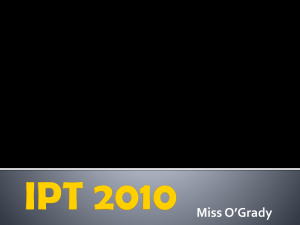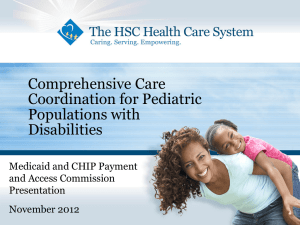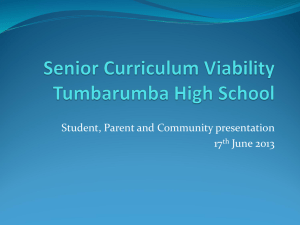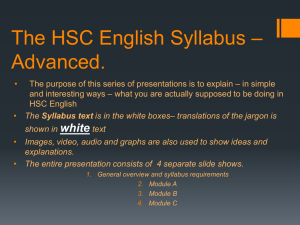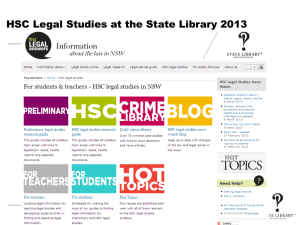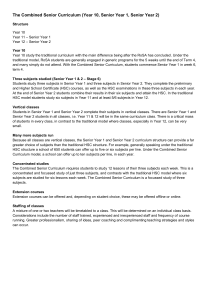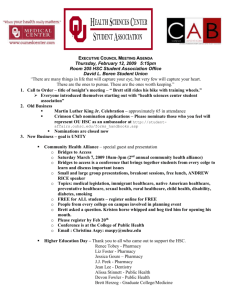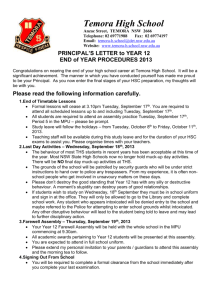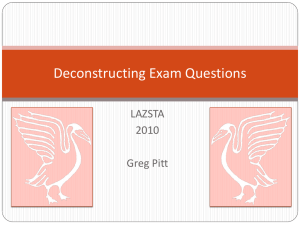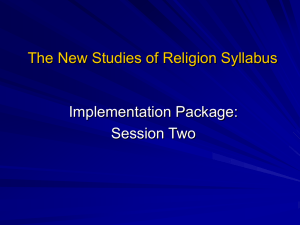ADVICE FOR HSC STUDENTS - James Fallon High School
advertisement
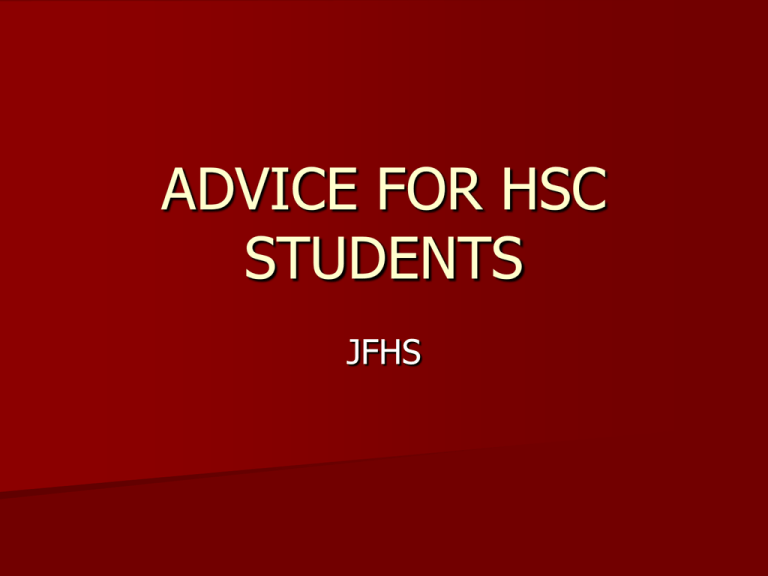
ADVICE FOR HSC STUDENTS JFHS ADVICE FOR THE HSC FOLLOWING A REVIEW OF HSC EXAMINATIONS These points should be read in conjunction with – The notes from the marking centres – HSC Assessment policies – HSC Performance Band Descriptors – How your HSC works These are all on the Board of Studies website HSC EXAMINATIONS SUMMARY About 10% of all exams are marked onscreen via secure internet. The speed, efficiency and success of this program means that it will be expanded. ALERTS FOR 2010 EXAMINATION SPECIFICATIONS In 2008 the Board decided to change the specifications for some HSC examinations starting from 2010. This will result in new formats for some examination papers this year. Full details are on the Board’s website. GLOSSARY FOR KEY WORDS The Boards Glossary for Key Words contains some terms commonly used in examination questions. The glossary is a useful guide to question formats, but it is not exhaustive; HSC students must be prepared for many kinds of questions. QUESTION FORMAT In the past, many HSC students showed a concern if a style of question was introduced that had not appeared in previous exams or specimen papers. Each year the examination committees follow a framework for each subject. While these committees don’t set out to “trick” students but they will avoid predictive paper. QUESTIONS WITH STIMULUS MATERIAL Examination committees may change stimulus material where they believe it is necessary. Carefully read the stimulus material and use it for the questions specified. Just because it is not in the previous paper does not mean it won’t happen. MULTIPLE CHOICE QUESTIONS A number of students have reported concern about particular multiple choice questions. This is designed to test specific knowledge for the best possible answer, so answers with partially right content can be in the multiple choice section. MANAGING DIFFICULT QUESTIONS HSC examinations are intended to be rigorous and to challenge students of all abilities. HSC students should know that there is no “best fit” answer for each section. Although there are expectations, you should be prepared for the questions on the day, rather than those you think might be in the examination. MANAGING DIFFICULT QUESTIONS Remember, that an attempt is better than a non attempt, and that if you find it challenging, chances are that others in the candidature may find it challenging as well. PREPARING FOR YOUR EXAM Keep looking on your Students Online facility. Keep your details up to date, and look for advice. VET exams for our school are here in the hall, but TAFE exams might be in other locations. ACCEPTABLE BEHAVIOUR Clearly, it is unacceptable to create disturbances during the reading time or examination, regardless of your feelings toward the examination, your stress levels, or any other matter. COURSES CONTAINING PROJECTS OR PERFORMANCES Ensure that you have the correct information about dimensions of projects, elements of performances, and when a project must be submitted. Your teacher will have these details, and is probably repeating them often. More advice can be found on HSC Examinations: Projects, submitted works and performances on the website. NON SERIOUS ATTEMPTS AND NON ATTEMPTS All students have to make a genuine effort at the papers they sit. The Board will consider a non-attempt if there is no evidence of academic engagement with the paper. This includes answering multiple choice only. Students with their papers found to be in the above categories will be asked by the Board to justify why they should receive a result in the subject in question. This will render students ineligible for the HSC. APPLICATION FOR SPECIAL PROVISIONS These are available, but they must be put in in a timely manner. 4817 applications were received last year, 2901 were approved in full, 1694 partially approved, and 222 fully declined. MALPRACTICE There have been a number of cases were students have brought unauthorised material into the room – aka notes on phones, etc. At the commencement of each exam, the presiding officer asks if there is any unauthorised material. If you discover any unauthorised material at this time, you can hand it in without penalty. However…if discovered later, and you have not handed it in, it is malpractice. ILLNESS/MISADVENTURE Sometimes things spiral outside of our control. If this occurs, you may apply for an illness/misadventure. Last year, 4400 individual appeals were received, 3987 of these were upheld, and 413 declined. It is very important that you have supporting documentation for this application. Students should never risk harm to attend an examination.

